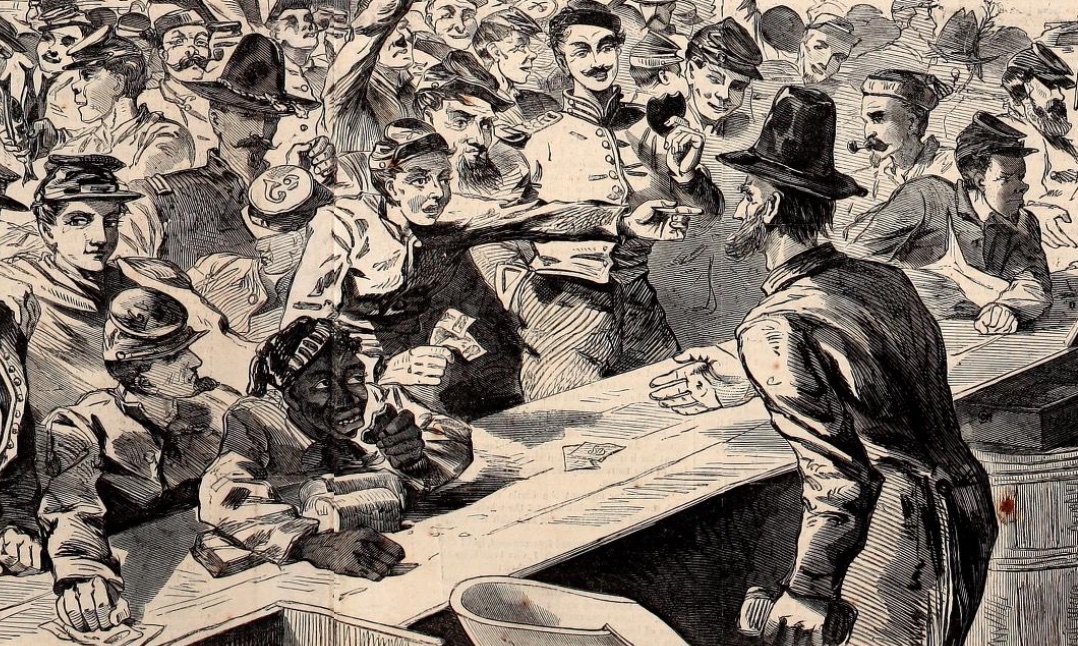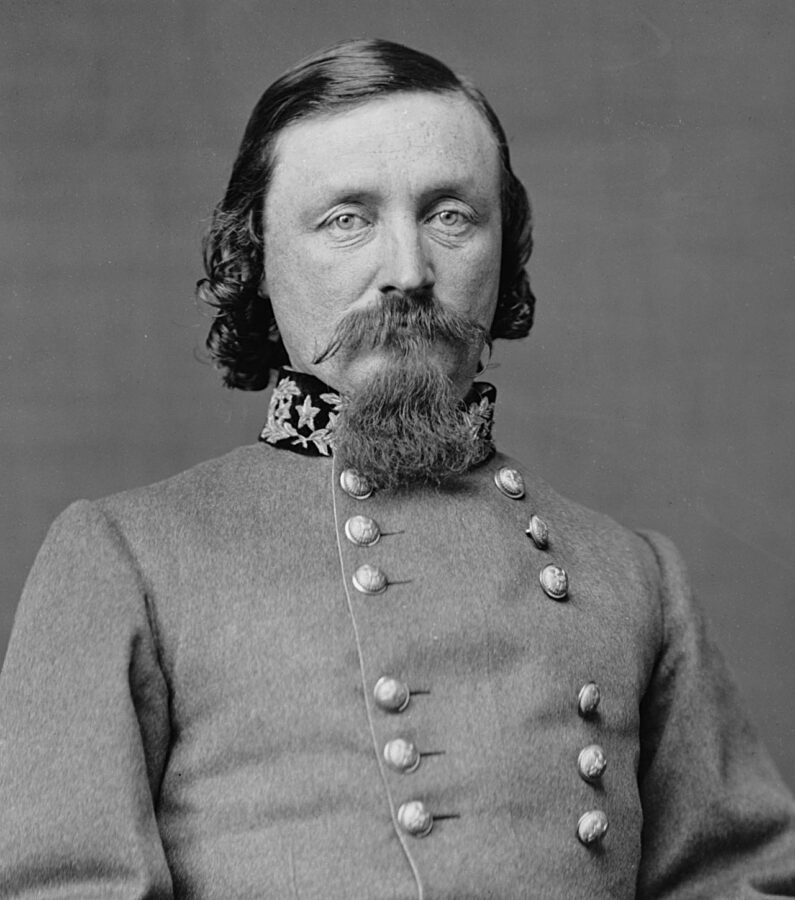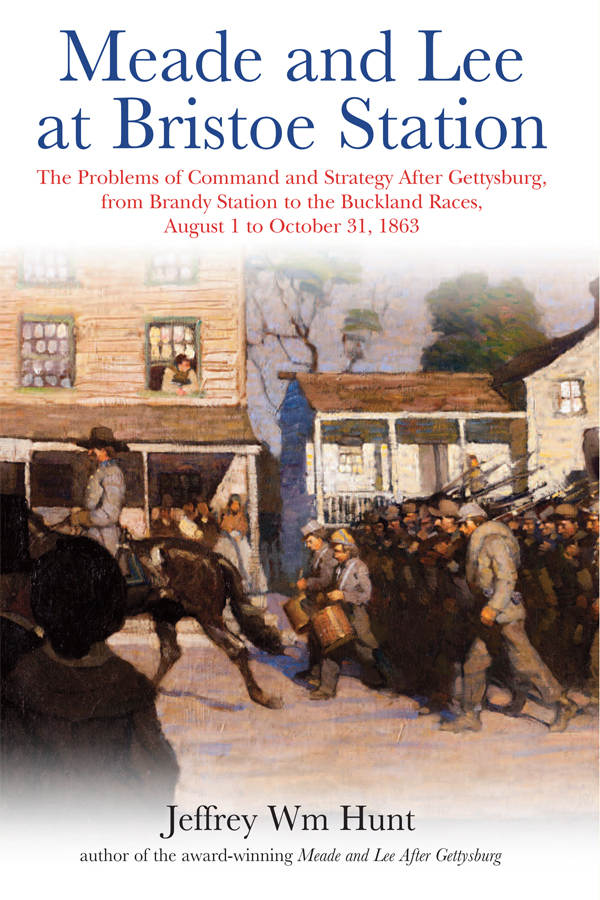 In the Voices section of the Winter 2016 issue of The Civil War Monitor we highlighted first-person quotes about some of the colorful oaths uttered by soldiers and civilians during the Civil War. Unfortunately, we didn’t have room to include all that we found. Below are those that didn’t make the cut.
In the Voices section of the Winter 2016 issue of The Civil War Monitor we highlighted first-person quotes about some of the colorful oaths uttered by soldiers and civilians during the Civil War. Unfortunately, we didn’t have room to include all that we found. Below are those that didn’t make the cut.
“I ran to the top of the hill, ordered them to halt, but on they went. I ran on calling to them, and sent three pistol balls whistling after them. On they went. At a moment’s reflection, I raised my voice, and uttered a great mouthful of oaths—not natural, but got up for the occasion. They stopped as if an iron wall had dropped before them. They returned, and were surprised to find me alone. ‘Twas difficult to convince them that it was I who swore. They did not believe ‘that any man in the army, save our Brigadier, could utter any such oaths as that.’ I felt flattered, and thought that I had earned promotion.”
—Alfred Castleman, 5th Wisconsin Infantry, on corralling a group of litter-bearers from his regiment that had been scattered by incoming Confederate shells during the Battle of Glendale, June 30, 1862
“Great was the tribulation, and much audible cursing resulted, while the secret history of oaths unuttered, would I’m afraid, fill many volumes, and in all human probability cause, if made public, the appointment of many army chaplains.”
—Charles Wright Wills, 103rd Illinois Infantry, on his comrades’ reaction to being unable to stay dry and warm in camp after a heavy snowstorm, in his diary, January 1863
“I have lost one poor boy…. He died Saturday; and the Tuesday after, at noon, came his poor father and mother…. I never witnessed more intense grief; for he was their only boy, and they were so proud of him. But he was the wickedest boy I have ever seen die; almost his last breath was an oath…”
—Mary Phinney, in a letter written while a nurse in an Alexandria, Virginia, hospital, January 1863
“[T]here is a boy in that tent—an awful boy with no arms, who swears so frightfully (all the time he isn’t screeching for currant pie, or fried meat, or some other indigestible), that he turns you blue as you listen.”
—Volunteer nurse Sarah Chauncey Woolsey, in a letter to her sister, July 22, 1862
“If the oaths then perpetrated were recorded in heaven, the recording angel would certainly have been justified had he have ‘dropped a tear upon the page and blotted them out forever.’ Our army swore terribly….”
—Alfred Castleman, 5th Wisconsin Infantry, on his regiment receiving news that their orders to march had been countermanded after hours spent packing up camp, in his diary, May 18, 1862
“Profanity, which heretofore was largely indulged in is now seldom heard, probably for the reason that there is now nothing to swear at. This abominable vice is endemic in its symptoms and character. Men who at home would shudder at the awful swearing which escapes their lips, scarcely open their mouths without letting fly an oath or two, and when their attention is called to it, they wonder how the practice could have grown upon them. And then too, men who have been quiet at their home work, not given to much talk, become noisy and full of tongue. This too, abates in course of time, and they resume their former quiet demeanor. All the good qualities will finally overcome the more pernicious ingredients of character, but it requires discipline and mental restraint, regularity of duty, and good example on the part of those in authority to effect the change.”
—John C. Myers, 192nd Pennsylvania Infantry, in his diary, September 13, 1864
“We were suffered at last to crowd into the cabin, all grumblers. Ed could hardly make himself heard, though his lungs are good. The wrath of the regiment vented itself in every form,— the oath, the deprecation, the remonstrance. Tom Barker fairly blued the air about him with vocal brimstone and sulphur,— a most accomplished and full-lunged blasphemer. From him, there was every gradation down to a little fellow who remonstrated with a gentle spill of milk and water.”
—James K. Hosmer, a former clergyman who enlisted as a private in the 52nd Massachusetts Infantry, on the regiment’s reaction to boarding a steamship transport, November 29, 1862
“I must frankly acknowledge that I have heard more swearing in a regiment of our men in one day, than I have heard among these two thousand rebs since their arrival here.”
—Union officer John E. Whipple on recently arrived Confederate captives at Elmira Prison, New York, July 1864
“Go where you will, nothing but the most fearful curses and cries for revenge can be heard.”
—Thomas Keenan, 17th Massachusetts Infantry, on the reaction in the ranks to the news of Abraham Lincoln’s assassination, April 20, 1865
“[I]f I must swear, I will; but all sins of the oath must rest on your shoulders, for I swear on your compulsion: ‘G—d d—m every Yankee to h—l!’”
—Confederate War Department clerk John Beauchamp Jones, quoting the story of a young woman in Nashville who was instructed by a Union officer to take the Oath of Allegiance to the U.S., in his diary, May 1863
“I shall never forget his gentle rebuke to a soldier who, in the very presence of death, was swearing in a decided manner: ‘Don’t swear so, my man. You may be killed at any moment. Surely you do not wish to go into the next world with dreadful oaths upon your lips.’”
—Union officer George Ward Nichols, in his diary, on the interaction between General O.O. Howard and a soldier in his command, February 5, 1865
“One night … I listened to a couple of fellows in our company awhile, and finally spoke. ‘Boys,’ said I, ‘I think if you keep on you will make first-rate swearers. I’ve heard you use fifty-nine oaths in about ten minutes.’ ‘Is that so?’ said one. ‘Yes,’ said I, and they stopped talking at once. One of them told me since we came here, that he had broken himself of the habit entirely. He was getting ashamed of it.”
—Oliver Wilcox Norton, 83rd Pennsylvania Infantry, August 1, 1862
“He is … [o]ne of the most despicable, insignificant, fire-weed characters; phosphroic, ill-tempered, hell-infused images of man that ever served a worthless, wicked cause! He will stand at the gate for hours with a revolver in hand, occasionally pointing and snapping it, swearing piratically, calling them ‘dirty sons of b—s,’ ‘lousy hell devils,’ laughing fiendishly. He often snatches clubs and throws them with all vengeance into crowds of prisoners who come to look at the brute fool, attracted by his loud oaths.”
—Andersonville captive John Northrop, on the prison’s commander, Captain Henry Wirz, in his diary, October 1864
 National Archives
National ArchivesGeorge Pickett
“He gave me the benefit of all the swear words in his vocabulary when I tried to make him understand that there are weightier things and subjects of greater moment than the mere loss of personal property.”
—Confederate general George Pickett on the reaction of the old family friend who bore the news that Pickett’s house had been burned down by Union troops in June 1864. “The poor old chap is sensitive because I did not rave and rage with him, and resents what he considers my indifference,” Pickett explained in a letter to his wife
“He is rather rough, but brave to a fault. He has gone through the 32 battles in which our Regiment has been engaged, and has not been hurt…. He is a Lutheran, but will swear a little as a ‘military necessity’ as he says. I once heard him order the soldiers to ‘stop their d—d swearing,’ without a smile, and in all sincerity.”
—Chaplain Hallock Armstrong, 50th Pennsylvania Infantry, on the regiment’s major, George W. Brumm, in a letter to his wife, July 17, 1865
“It was an abominable place. As we drew near, the most fearful imprecations saluted our ears, obscene jests, scurrilous abuse, profane oaths, mingled with loud, hollow, unearthly laughs.”
—Relief worker Elizabeth L. Comstock on the Alexandria, Virginia, military prison called the “Slave Pen,” in a letter to her sister, January 9, 1863
“They taught us some thunderous German words to say when we feel like swearing at the Yankees, because Cora said she felt like doing it a dozen times a day, but couldn’t because she was a woman. I remember this much: ‘Potts-tousand-schock-schwer an oat—’ and my brain could carry no more…. I would prefer a good, round, English ‘damn’ anyway, if I dared use it.”
—Georgia resident Eliza Frances Andrews, on a conversation she and her sister had with several former Confederate soldiers shortly after war’s end, in her diary, May 1865
“It is hard not to curse him.”
—Southern diarist Mary Boykin Chesnut’s thoughts on General William Tecumseh Sherman, after witnessing the destruction wrought by his Union army in South Carolina, May 2, 1865
“I spent a few minutes listening to the hum of 10,000 tongues cursing the Yankees, talking of home and thinking of how pleasant it would be to take a bath and a toddy, and how sad my wife would feel if she knew all that I was undergoing.”
—Texas Brigade soldier John Camden West, on the scene in camp after a day-long march by the Army of Northern Virginia, in a letter to his wife, June 8, 1863
“Such was their blasphemous language, their horrible countenances & appearance, that we realized what must be the association of the lost in the world of eternal woe. Their throats were open sepulchres.”
—Georgia resident Mary Jones on the Union soldiers who entered and ransacked the family residence, in her diary, December 16, 1864
“I saw a heap of clothing tumble out of a large covered cart, and cried out after the driver, ‘Stop! stop! All the things are tumbling out of the cart.’ But my zeal was checked by a scoundrel putting his head out, and shouting with a curse, ‘If you try to stop the team, I’ll blow your —— brains out.’ My brains advised me to adopt the principle of non-intervention.”
—British journalist William Howard Russell, on an encounter during the panicked Union retreat from the battlefield of Bull Run, in his diary, July 1861
Sources: The Army of the Potomac, Behind the Scenes (1863); Army Life of an Illinois Soldier (1906); Adventure of an Army Nurse in Two Wars (1903); Letters of a Family during the War for the Union (1899); The Army of the Potomac, Behind the Scenes (1863); A Daily Journal of the 192d Reg’t Penn’a Volunteers (1864); The Color-Guard (1864); Soldiers’ Letters, from Camp, Battle-field and Prison (1865); Soldiers’ Letters, from Camp, Battle-field and Prison (1865); A Rebel War Clerk’s Diary (1866)​; The Story of the Great March (1865); Army Letters, 1861–1865 (1903); Chronicles from the Diary of a War Prisoner in Andersonville … (1904); The Heart of a Soldier (1913); Letters from a Pennsylvania Chaplain at the Siege of Petersburg, 1865 (1961); Life and Letters of Elizabeth L. Comstock (1895); The War-Time Journal of a Georgia Girl 1864-1865 (1908); A Diary from Dixie (1905); A Texan in Search of a Fight (1901); Yankees a’Coming (1959); My Diary North and South (1863).
Image from Harper’s Weekly

